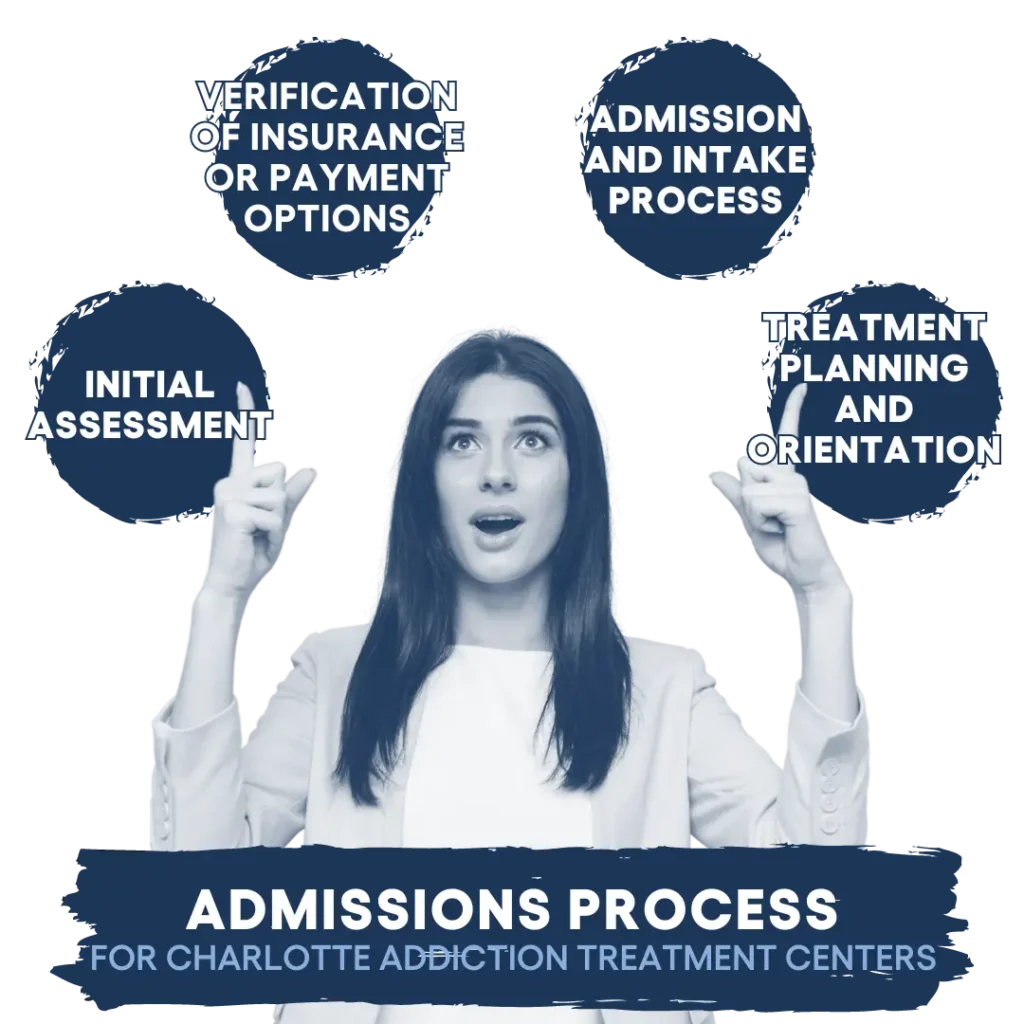If you are in the Charlotte, NC area and need help with drug and alcohol addiction – call (704) 248-8561.

Charlotte, the “Queen City,” is popular among residents and tourists alike – with so many different opportunities. Like most cities worldwide, Charlotte residents face struggles associated with addiction and mental health disorders. These can range in type and severity, including depression, anxiety, bipolar disorder, post-traumatic stress disorder (PTSD), and drug and alcohol addiction.
Charlotte offers a range of substance abuse treatment options for individuals struggling with drug and alcohol addiction. These Charlotte drug treatment centers offer guidance, community-based support, program opportunities, and more to aid in sobriety journeys.
In Charlotte, there are a variety of drug and alcohol treatment services available. Many of these programs are geared toward the individual's unique needs and personalized plans to achieve long-term sobriety.

Choosing a Charlotte drug treatment center is an important decision that requires careful consideration. Several factors should be considered to ensure that the chosen facility aligns with the individual's needs and offers comprehensive support for recovery.
Here are ten key considerations:
1. Treatment Approach:
Different treatment centers may employ various approaches to addiction treatment, including medical detox, therapy, counseling, and holistic therapies. It’s essential to understand the treatment modalities offered by each center and determine whether they align with personal preferences and needs.
2. Accreditation and Licensing:
Verify that the treatment center is accredited by reputable organizations such as the Joint Commission or the Commission on Accreditation of Rehabilitation Facilities (CARF). Accreditation ensures that the facility meets quality standards and adheres to best practices in addiction treatment. Additionally, ensure that the facility and its staff hold the necessary licenses and certifications required by state regulations.
3. Specialized Programs:
Some individuals may have specific needs or preferences regarding treatment, such as dual diagnosis treatment for co-occurring mental health disorders or gender-specific programs. Consider whether the treatment center offers specialized programs tailored to these needs.
4. Staff Credentials and Experience:
Research the qualifications and experience of the treatment center’s staff, including therapists, counselors, and medical professionals. Ensure that they have the expertise and training necessary to provide effective addiction treatment and support.
5. Continuum of Care:
Recovery from addiction is a long-term process that requires ongoing support and aftercare. Evaluate whether the treatment center offers a continuum of care, including follow-up services, support groups, and resources for transitioning back into daily life after treatment.
6. Amenities and Facilities:
Consider the amenities and facilities available at the treatment center, such as comfortable accommodations, recreational activities, and wellness amenities. While these may not be the primary focus of treatment, they can contribute to the overall experience and comfort of the individual during their stay.
7. Location and Environment:
The location and environment of the treatment center can also play a significant role in the individual’s recovery journey. Some individuals may prefer a facility located in a serene and secluded setting, while others may prefer a more urban environment. Consider whether the location and surroundings align with the individual’s preferences and needs.
8. Cost and Insurance Coverage:
Addiction treatment can be costly, so it’s essential to consider the cost of treatment and whether the facility accepts insurance or offers financing options. Review the facility’s pricing structure and determine what services are covered by insurance.
9. Reviews and Testimonials:
Research online reviews and testimonials from former clients and their families to gain insight into the treatment center’s reputation and quality of care. Pay attention to feedback regarding the effectiveness of treatment, the professionalism of staff, and the overall experience.
10. Gut Feeling:
Trust your instincts when evaluating treatment centers. If something doesn’t feel right or if you have concerns about the facility, it may be best to explore other options. Ultimately, choosing a treatment center is a deeply personal decision, and finding the right fit is essential for long-term success in recovery.

Charlotte provides a wealth of community resources, including support groups, counseling services, sober living homes, vocational training programs, and legal assistance for individuals dealing with substance abuse and mental health issues.
Here are a few addiction-related treatment resources available in Charlotte:
Mecklenburg County Community Support Services – Substance Use Services
Southeastern Recovery Center – Drug and Alcohol Addiction Treatment
SAMHSA National Helpline – Confidential, free help from public health agencies to find more information on addiction and mental health resources.

Understanding local statistics on drug and alcohol addiction can shed light on the prevalence and impact of substance abuse in Charlotte. These statistics can inform policy decisions, resource allocation, and community interventions aimed at addressing addiction issues.
Congratulations on taking the first step to living a sober life! The admissions process for a Charlotte drug and alcohol rehabilitation center may vary based on the facility’s internal processes, but in general, you can expect the following four steps:

The first step for individuals seeking treatment is to undergo an initial assessment. This assessment may involve a phone call or an in-person meeting with an admissions counselor or intake coordinator. During this assessment, the individual will be asked about their substance use history, medical history, mental health concerns, and any previous treatment experiences. The goal of this assessment is to gather information to determine the most appropriate level of care and treatment plan for the individual.
After the initial assessment, the admissions team will assist the individual in verifying their insurance coverage or exploring other payment options. They will work with the individual to understand their financial situation and determine the best course of action for covering the cost of treatment. If the individual has insurance, the admissions team will coordinate with the insurance provider to determine coverage for substance abuse treatment services.
Once insurance coverage or payment arrangements have been confirmed, the individual will proceed with the admission and intake process. This may involve completing paperwork, signing consent forms, and providing necessary personal information. The admissions team will also provide the individual with information about what to expect during their time in treatment, including rules and expectations, daily schedules, and available support services.
After completing the admission and intake process, the individual will meet with a treatment team to develop a personalized treatment plan. This treatment plan will outline the individual’s goals for recovery, as well as the specific therapies and interventions that will be used to achieve those goals. The individual will also receive an orientation to the rehab facility, including a tour of the premises and an introduction to staff members and fellow clients.
AA (Alcoholics Anonymous) and NA (Narcotics Anonymous) meetings are vital support groups for individuals struggling with addiction in Charlotte. These meetings provide a safe and confidential space where individuals can share their experiences, struggles, and triumphs with others who understand firsthand the challenges of addiction.
By following the 12-step program, participants gain valuable tools for maintaining sobriety and rebuilding their lives. These meetings offer a sense of community and belonging, nurturing connections with peers who offer empathy, encouragement, and accountability. Through regular attendance and active participation, individuals can break the cycle of addiction, rebuild their relationships, and reclaim control over their lives, ultimately achieving long-term sobriety and fulfillment.
To find local meetings, call 800-681-2956 – or check out a list below to get started.
To find local meetings (in-person and virtual), click here – or check out the list below.
Explore sober-friendly activities and events in Charlotte, such as outdoor recreation, fitness classes, art workshops, support group meetings, and cultural events. Engaging in sober activities can promote social connections and enhance overall well-being during recovery.
Here are some sober activities you can do in Charlotte:

Paying for addiction and mental health treatment may feel overwhelming – but options are available. Some of the more common options available at most Charlotte recovery centers are:

Many addiction and mental health facilities in Charlotte accept insurance. Before entering a treatment plan, check to see what your insurance will cover and what out-of-pocket expenses you may be liable for.

If you are financially unable to pay for treatment, you may be eligible for sliding scale fees. The payment structure is determined by income and makes paying for Charlotte recovery center treatment more attainable.

If your insurance doesn’t cover your treatment and you don’t qualify for sliding scale fees, you may be able to negotiate a payment plan with the treatment facility you intend to work with.
Recovery is possible, and it starts with the right support. At Southeastern Recovery Center, we understand that addiction affects everyone differently. That's why we offer specialized treatment programs designed to address the unique challenges of each substance, providing you with the personalized care you deserve.

Charlotte offers a range of addiction treatment programs, including inpatient rehab, outpatient rehab, detoxification services, counseling, therapy, and aftercare support.
The duration of addiction treatment varies depending on individual needs and the specific program. Treatment may last anywhere from a few weeks to several months, with aftercare support available for ongoing recovery.
Many rehab centers in Charlotte accept health insurance plans, but coverage varies depending on your provider and policy. Contact your insurance company or the rehab center directly to verify coverage and explore payment options.
Yes, family involvement is often encouraged in addiction treatment programs in Charlotte. Rehab centers may offer family therapy sessions, educational workshops, and support groups to help families understand addiction and support their loved one's recovery.
